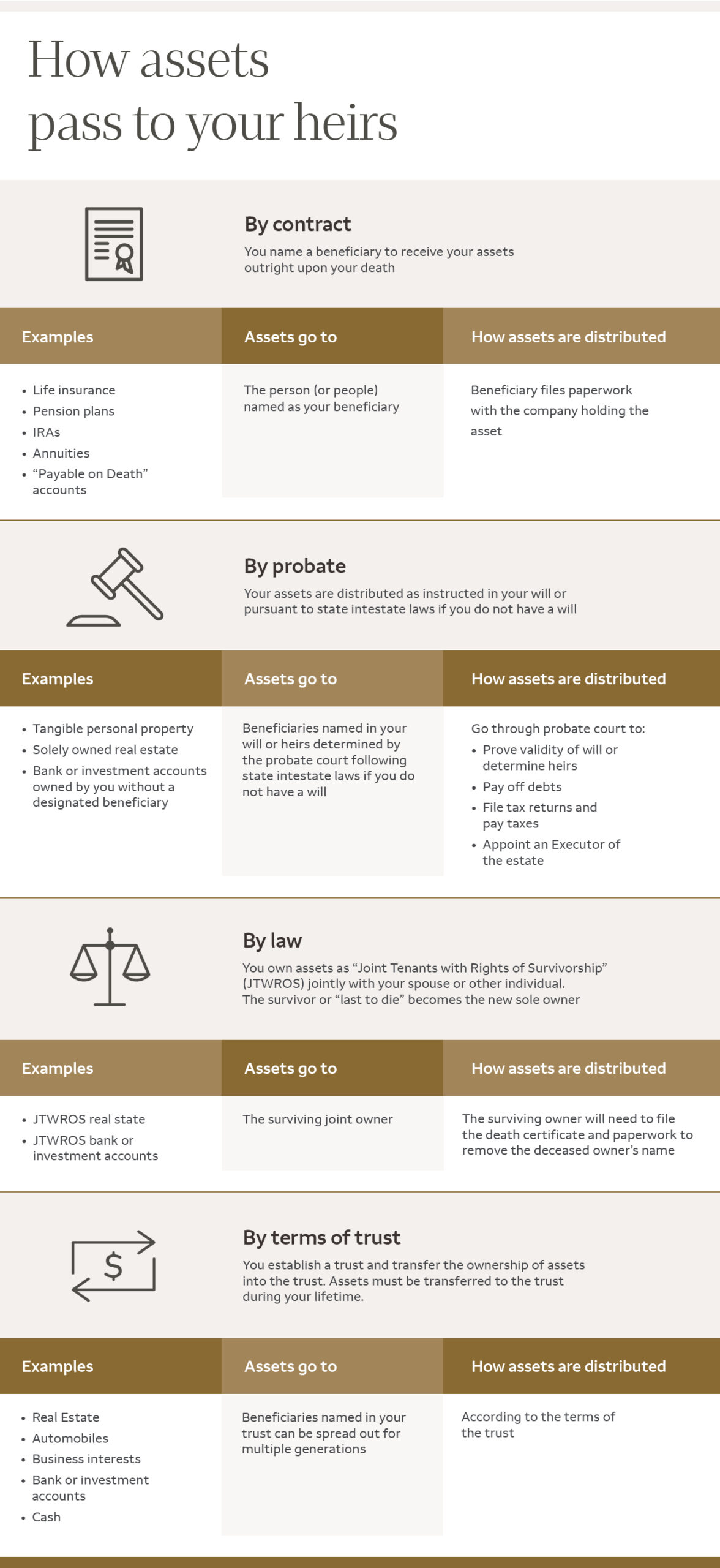Here are some tips to potentially make these conversations more successful:
- Schedule a specific time for the discussion. Make sure you have adequate time to share details and allow time for questions.
- Share the goals behind the plan along with its structure — like how assets will flow when the plan is implemented. Refer to the infographic below for the ways different assets are treated.
- Focus on the main objectives of providing clarity and preventing potential discord, while being true to your comfort level with the amount of detail you want to share.
- Outline key roles and documents. Plan to share the identity of your executor or trustee as well as the location of important documents, such as power of attorney, living will, and healthcare power of attorney.
For guidance in designing a family meeting about your estate plan, talk to your advisor and estate attorney. Also, if having a face-to-face discussion is difficult, consider writing a letter that can be left with your estate planning documents to clarify your wishes to all beneficiaries as well as the appointed executor and trustee.

How assets pass to your heirs
By contract
You name a beneficiary to receive your assets outright upon your death.
Examples:
- Life insurance
- Pension plans
- IRAs
- Annuities
- “Payable on Death” accounts
Assets go to:
The person or people named as your beneficiary
How assets are distributed:
Beneficiary files paperwork with the company holding the asset.
By probate
Your assets are distributed as instructed in your will or pursuant to state intestate laws if you do not have a will.
Examples:
- Tangible personal property
- Solely owned real estate
- Bank or investment accounts owned by you without a designated beneficiary
Assets go to:
Beneficiaries named in your will or heirs determined by the probate court following state intestate laws if you do not have a will.
How assets are distributed
Go through probate court to:
- Prove validity of will or determine heirs
- Pay off debts
- File tax returns and pay taxes
- Appoint an Executor of the estate
By law
You own assets as “Joint Tenants with Rights of Survivorship” (JTWROS) jointly with your spouse or other individual. The survivor or “last to die” becomes the new sole owner.
Examples:
- JTWROS real estate
- JTWROS bank or investment accounts
Assets go to:
The surviving joint owner
How assets are distributed:
The surviving owner will need to file the death certificate and paperwork to remove the deceased owner’s name.
By terms of trust
You establish a trust and transfer the ownership of assets into the trust. Assets must be transferred to the trust during your lifetime.
Examples:
- Real estate
- Automobiles
- Business interests
- Bank or investment accounts
- Cash
Assets go to:
Beneficiaries named in your trust can be spread out for multiple generations.
How assets are distributed:
According to the terms of the trust
Holding assets in trust allows you to specify how and when your assets will be distributed to your loved ones or to causes you care about.
Talk to your advisors about evaluating how your assets are currently held, how they will pass to your beneficiaries, and how to make changes, if necessary, with the assistance of your estate planning attorney.
Trust services are available through Wells Fargo Bank, N.A. Member FDIC and Wells Fargo Delaware Trust Company, N.A. Any estate plan should be reviewed by an attorney who specializes in estate planning and is licensed to practice law in your state.




